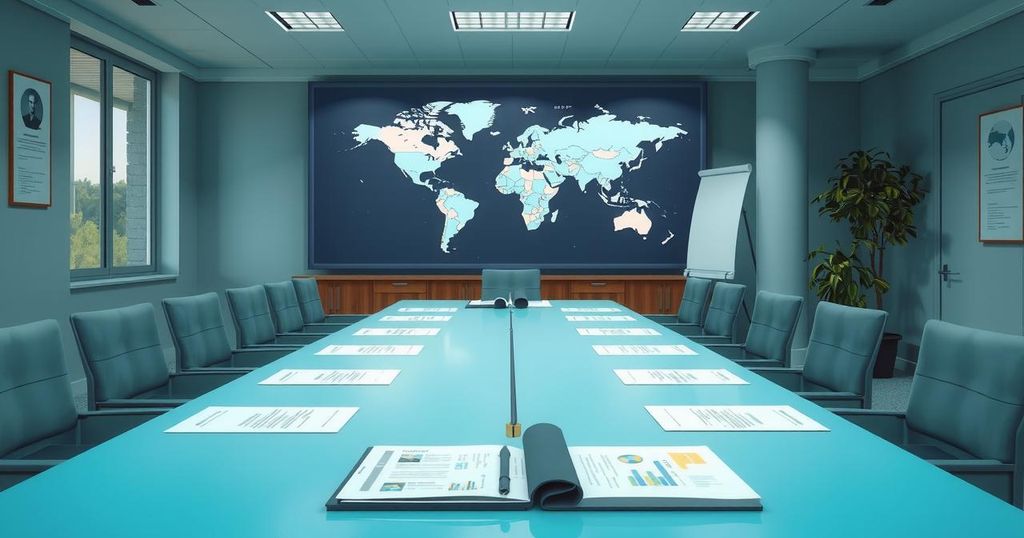Iran’s Foreign Minister Abbas Araghchi has arrived in Oman for renewed nuclear talks with the U.S. after previous rounds showed some progress. Araghchi leads a team of diplomats and technical experts, with U.S. representation from special envoy Steve Witkoff. Key discussions will focus on Iran’s nuclear program, amidst ongoing scrutiny and sanctions from the U.S. following Trump’s withdrawal from the 2015 nuclear deal.
Abbas Araghchi, Iran’s foreign minister, has landed in Oman as preparations for renewed nuclear discussions with the U.S. ramp up. The visit, which kicked off on Friday, comes after both sides acknowledged earlier progress in negotiations. Esmaeil Baqaei, a spokesperson for Iran’s foreign ministry, shared the diplomat’s arrival via a post on X, confirming this as the third round of dialogue.
In a video released by Iran’s Mehr news agency, Araghchi can be seen stepping off an Iranian government aircraft in Muscat. He is leading a team of diplomats and technical specialists for these indirect talks with U.S. officials. The U.S. delegation will be headed by Steve Witkoff, who serves as President Donald Trump’s special envoy to the Middle East.
The upcoming discussions will focus on Iran’s nuclear ambitions, with the U.S. represented by Michael Anton, who oversees policy planning at the State Department. For Iran, deputy foreign ministers Kazem Gharibabadi and Majid Takht-Ravanchi are tasked with spearheading the technical discussions. Baqaei stated on social media that the Iranian side is determined to uphold their right to peaceful nuclear energy use, emphasizing the need for the quick removal of sanctions.
Baqaei wrote that the Omani Foreign Minister, Badr Albusaidi, is set to mediate the talks again on Saturday morning. This ongoing dialogue follows previous discussions held in Muscat and Rome, which started back in April. Since returning to power in January, Trump has imposed strict sanctions against Iran, reviving his administration’s “maximum pressure” policy.
In March, Trump even reached out directly to Iran’s Supreme Leader, Ayatollah Ali Khamenei, seeking negotiations but cautioning that military action might ensue if talks falter. Iran has consistently denied claims from Western nations, including the U.S., asserting that it aims to develop nuclear weapons, insisting instead that their program is strictly for civilian use.
Earlier on the same day, Baqaei argued that noticeable progress in the talks would demand an authentic commitment from all parties involved. In a recent interview, Araghchi reflected on the seriousness of Iran’s approach, stating the potential for meaningful advancement exists if the U.S. also approaches the situation earnestly.
The backdrop of this dialogue is steeped in history; Trump withdrew the U.S. from a significant nuclear deal in 2018, which resulted in Iran scaling back its compliance after initially adhering to the terms for a year. Currently, Iran is enriching uranium up to 60 percent—a level that surpasses the 3.67 percent cap set by the 2015 agreement but is still below the threshold for weapons-grade material.
In a Time Magazine article published today, Trump warned that the U.S. would be ready to take aggressive actions against Iran should the renewed talks fail to yield a deal. However, he also expressed optimism about the potential for a new agreement and indicated he would be willing to meet with Khamenei directly.
In summary, Iran’s foreign minister has landed in Oman to engage in new nuclear discussions with the U.S., fueled by prior progress in negotiations. The talks focus on Iran’s nuclear activities and the potential for sanctions relief under the observation of the Omani Foreign Minister. However, significant challenges remain, particularly due to the strained relations stemming from previous U.S. withdrawal from the nuclear deal and extensive sanctions. Both parties now face the critical task of demonstrating goodwill to achieve viable outcomes in these talks.
Original Source: www.france24.com






